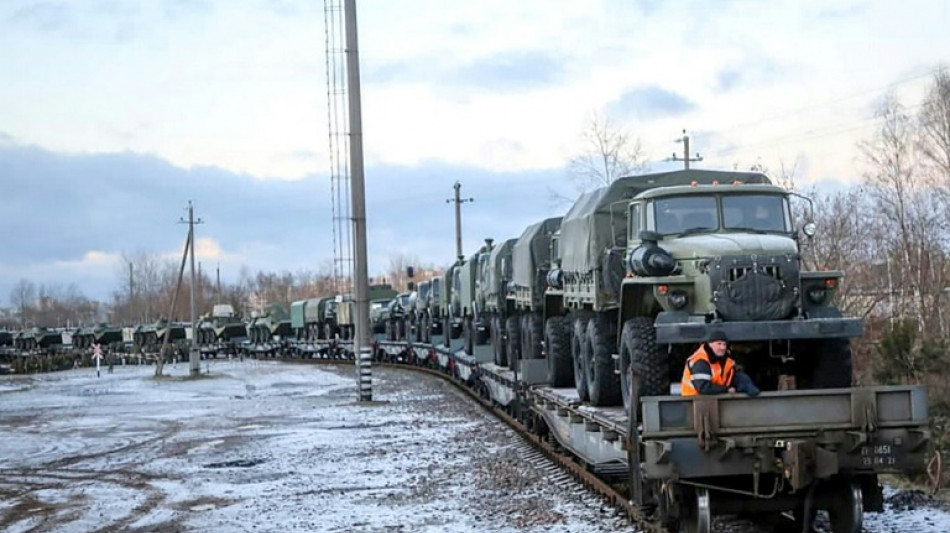
US warns Russia poised to attack Ukraine 'at any point'

The United States raised the alarm Tuesday on a potentially imminent Russian attack against Ukraine, ahead of a whirlwind diplomatic mission by Secretary of State Antony Blinken.
With tens of thousands of Russian troops already massed on Ukraine's borders, Blinken flew to meet with the Ukrainians and European allies, ahead of talks with Russian Foreign Minister Sergei Lavrov on Friday.
US officials upped the threat level, saying that the slow-brewing crisis was reaching a dangerous new stage.
"We believe we're now at a stage where Russia could at any point launch an attack on Ukraine," White House Press Secretary Jen Psaki said. "I would say that's more stark than we have been."
In an ominous new development, a senior State Department official said there is concern that draft constitutional reforms in Belarus, an authoritarian state closely allied to Moscow, could allow deployment of Russian nuclear weapons.
This came as Russian troops poured into the country for what were said to be training exercises but at levels that the US official said were far "beyond normal."
Russia insists it has no plans to invade Ukraine, where in 2014 it already seized one province and backed separatist rebels in another region.
However, Moscow's build-up of offensive weaponry and troops leaves little doubt that at least a potential assault is being prepared as a way to back the Kremlin's broader aim of preventing pro-Western Ukraine from leaving the Russian sphere of influence.
Among Russia's demands is a pledge from the NATO alliance that it never offer Ukraine membership -- something NATO calls a non-starter.
Psaki blamed the Russian leader, saying "President Putin has created this crisis" and warned again that unprecedented economic sanctions would follow a Russian attack against Ukraine.
"No option is off the table" when it comes to sanctions, she said, warning of an "extremely dangerous situation."
Psaki stressed that this could include shelving the Nord Stream 2 natural gas pipeline from Russia to Germany.
The pipeline, which has been completed but not commissioned, is seen as an important part of Europe's energy supply network, but also a crown jewel in Moscow's export capabilities.
"Our view continues to be that stopping the Nord Stream 2 pipeline is a credible piece we hold over Russia," Psaki said.
- Multiple talks -
Blinken's diplomatic offensive follows inconclusive talks last week in Geneva, Brussels and Vienna, where Russia presented what Western governments say are unacceptable demands.
In a call with Lavrov ahead of his trip, Blinken "stressed the importance of continuing a diplomatic path to de-escalate tensions," State Department spokesman Ned Price said.
A readout from the Russian foreign ministry said Lavrov told Blinken that Moscow needs "concrete article-by-article" responses "as soon as possible."
He called on Blinken "not to replicate speculation about the allegedly impending 'Russian aggression'."
Earlier, Lavrov said at a joint press conference with visiting German Foreign Minister Annalena Baerbock there would be no further negotiations until the West responds.
In addition to barring Ukraine from eventual NATO membership, Moscow is demanding limits on NATO forces in current member nations like Poland and the Baltic states that were once in the Soviet bloc.
The US State Department said Blinken would meet with Ukrainian President Volodymyr Zelensky in Kyiv on Wednesday, to "reinforce the United States' commitment to Ukraine's sovereignty and territorial integrity."
Blinken will then hold four-way talks with Britain, France and Germany in Berlin before he meets Lavrov on Friday in Geneva.
- Belarus military drills -
Adding to the tensions, Russia and Ukraine's neighbor Belarus on Tuesday launched snap military exercises.
The Belarusian defense ministry said it was hosting the drills because of the continuing "aggravation" of military tensions, including on its western and southern borders.
Ukraine is located south of Belarus, and east of NATO and EU member Poland.
Neither Moscow nor Minsk has disclosed the number of troops involved, but video published by Belarus showed military vehicles including tanks being unloaded from trains.
"These numbers are beyond of course what we would expect with regards to a normal exercise right. A normal exercise requires notification 42 days in advance," the State Department official said.
NATO member Turkey also warned Moscow against invading Ukraine, with President Recep Tayyip Erdogan saying Tuesday he intends to discuss rising tensions with Putin.
Turkey has supplied combat drones to Ukrainian forces, drawing fierce criticism from Moscow.
burs-sms/bgs
K.M.Thompson--TNT